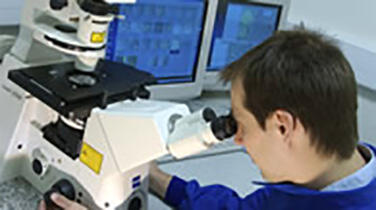
The Liverpool School of Tropical Medicine (LSTM) and the University of Liverpool (UoL) have secured a £1.4 million project grant to begin the development of new drugs to combat malaria.
The project, funded by the Wellcome Trust, aims to develop new antimalarial drug candidates which work by targeting a novel enzyme in the respiratory chain ofPlasmodium falciparum – the parasite that causes malaria.
The enzyme within the parasite is not found in humans, thereby fulfilling the most important prerequisite of a target for a 'magic bullet' - a drug capable of targeting an organism without affecting its host.
Having identified this enzyme, project PI Professor Steve Ward (LSTM), Professor Paul O’Neill (UoL) and Dr Giancarlo Biagini (LSTM) are now assembling a team of biochemists, pharmacologists, medicinal chemists and computational chemists to design new compounds that will successfully inhibit its operation. Drug candidates from this stage of the project will be put forward for further pre-clinical development.
Professor Steve Ward explained: "New drugs to treat malaria are urgently required because the parasite has evolved to develop resistance to traditional drugs and consequently more people die from malaria now than they did twenty years ago. This project is seeking to develop a drug which works differently.
"Our initial research indicates that if we can knock out this enzyme in the parasite we can stop the disease progressing through its usual stages within the body thereby eliminating the clinical symptoms of malaria and reducing the possibility of transmission to other people through mosquito bites."
Professor Paul O’Neill added: "This exciting project will further strengthen links between the University’s Chemistry department and LSTM. In addition to the synthesis of inhibitors, a team of molecular modellers, led by Dr N Berry (UoL), will use various computational techniques such as virtual screening to facilitate and inform the discovery process.
"This approach will provide a platform for future activities in this area of medicinal chemistry."
-ends-
For further information, please contact:
| LSTM Press Office | UoL Press Office |
| Office: +44 (0)151 705 3308 | Tel: +44 (0)151 794 2026 |